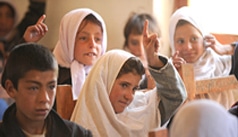Violence Against Women A Roadblock To Education
November 25 is the International Day for the Elimination of Violence Against Women. In places like Central Asia, women face the threat of violence every day, especially pioneering women who break tradition to attend school. This blog is part one of a three-part series, published at msmagazine.com, that tackles the violence women experience from their families, society, and culture. Education is key to ending violence, and our in-country partners are striving to create an environment that is safe for all students.
Women in Central Asia Risk Domestic Violence for Pursuing an Education
Accessing school in the rural villages of Afghanistan, Pakistan, and Tajikistan can be a harrowing experience for a woman. The nearest school may be a three- or four-mile walk on dangerous roads where she is subject to harassment from men she passes. The threat doesn’t always come from strangers, sometimes she is hiding her schooling from a male relative who will beat her, burn her, or even kill her for attempting to do something as harmless as learning to write her name. Violence against women is a very real concern.
The cornerstone of women’s equality and the prevention of violence against women is education, but access to classrooms, school supplies, and teachers is often scarce in the places that need it the most. UNICEF reports that
65 million girls were out of both primary and lower secondary schools in 2013. There is a myriad of reasons girls miss out on education from poverty to war and displacement, to violence or lack of resources.
Challenging Cultural Norms
Cultural and familial norms may limit access to education through threats of violence and shame or ridicule, even when resources are available. Villages deep-seated in tribal customs and conservative traditions expect women to care for children, tend to household duties, and serve their husbands. A woman who challenges these norms by going to school can be seen as shameful or immodest, damaging the honor of the family. Men are expected to control their women, and violence is a common way to punish transgressions.
According to a report by Global Rights, a human rights organization, an
estimated 90 percent of women in Afghanistan suffered physical, sexual, or psychological violence or forced marriage, most of it perpetrated by family. The situation is similar in
Pakistan with an estimated 70 to 90 percent of women subjected to domestic violence. Admitting to domestic violence in the family is taboo in these developing countries, so many women don’t report their abuse. If they leave their husbands or families, they will be exiled with no resources and no place to go.
Education Is Best Weapon Against Violence
Not all men and families are opposed to their wife’s, daughters, and sisters attending school. This is attitude is one that often precedes violence against women. Many men, especially those who have had schooling, see the value in women’s education as a way to help support their families. However, violent resistance is still common, especially in rural and conservative communities where most detractors are themselves uneducated.
Despite this, sentiment towards
girls’ education has been shifting in Central Asia for many years. Many more communities are making the change to support women’s literacy and girls’ education, despite the violence and threats.
Central Asia Institute (CAI), a nonprofit organization based in the U.S., works with partners in Pakistan, Afghanistan, and Tajikistan to build schools, provide teacher trainings, and promote education for girls in some of the most remote areas of the world.
The organization has initiated over
400 projects in the region and educated hundreds of thousands of girls and women. However, program mangers in each location still hear reports of women who face domestic violence for attempting to go to school. In rural areas, few resources for abused or battered women exist. Much like the U.S., abused women face stigma and shame and will not leave their husbands even when their lives are in danger.
Mahbuba Qurbonalieva, director of Central Asia Institute Tajikistan (CAI-T), explains, “When a woman gets married she will go to her husband’s house and will live with him. When she faces violence, she will not leave him as she has no place to go and she becomes dependent on her husband.”
In some cases, a girl whose father encouraged her to go to school will marry her to a man who’s family doesn’t believe in education. Her new family will forbid her to go to school, and may resort to beating her to ensure the new wife stays home.
Violence Stems From Dishonor, Not Fear Of Education
According to CAI sources in Afghanistan, the brother of a girl seeking education is frequently the perpetrator of violence. It may not be the education itself that is the problem, but the number of traditional expectations women must often break to get to school.
Wakil Karimi is the director of Central Asia Institute Afghanistan (CAI-A), and he explains that the brothers of the women are shamed when their sisters walk to school unaccompanied by a male relative. Other people in the village might laugh or gossip about the family, and the brother believes his reputation is dishonored.
“When people see [that his sister] is walking on the road he gets mad. Some boys will tease his sister because she is walking alone and they will tease him,” explains Wakil.
“[The brother says] ‘If my sister go out from my house to the school she will be much teased,’ and he does not accept that.”
Wakil recently recounted the story of a girl driven to suicide by her brother’s threats and attempts to keep her from school. Her story is just an example of the threats that keep women from seeking an education and the isolation that drives them to end their lives.
Abused Women May Resort To Suicide
CAI and CAI-A have created several Quick Learning programs that attempt to get older students up to speed before they enter a formal classroom for the first time. Wakil has a Quick Learning program in some of the communities surrounding Kabul, and Farnaz* finally convinced her father to let her go to school. He agreed, but warned that her brother would not approve, and if he found out, there would be consequences. Her brother was away, working in the army, and she kept her education a secret from him.
She was desperate to learn and attended classes despite the threat. After studying hard, she was ranked first in her grade-ten class and excited about her future.
During her midterm exams she got word that her brother was returning home for a visit. Farnaz fled to her aunt’s house to study and hide her books, and she told her brother she was helping her aunt for a few days.
In the village, her brother learned she had been going to school, and he was enraged. He stormed to the aunt’s house where he found his sister, crouched over her books and studying by candlelight. He tore her school books to pieces, threw them away, and forbid her to continue her studies. Farnaz dropped out of school, fearful of her brother’s threats if she were to go back to class. This one example of the violence against women taking place related to education.
Farnaz fell into a deep depression. School had made her happy, but fear of her brother’s retaliation stopped her from trying again. She refused to go outside or see family members. Desperate and depressed, she told her sister she would set herself on fire, but her sister didn’t take her seriously.
One week later she doused herself in petroleum and set fire to her clothing in the family’s storeroom. With over 95 percent of her body burned, she died two days later.
“When her brother found out, he was much sorry that he couldn’t do something to save his sister,” says Wakil.
Suicide has become the only escape option for many women living in fear of domestic violence. Wakil says, along with self-immolation, women take rat poison or drown themselves by jumping down wells.
Victims Have Nowhere to Turn For Help
Both Pakistan and Afghanistan have equality clauses written into their constitutions, and each country has recently passed laws that criminalizes violence against women. In 2009 Afghanistan passed a presidential decree, the Law on the Elimination of Violence Against Women, which banned under-aged and forced marriage, rape, and forced prostitution. Perpetrators now face much higher penalties for violating women’s rights.
However, enforcement of this law away from the cities like Kabul is inconsistent and ineffective. Even if authorities arrest the abuser for threatening a woman, few resources exist to help her. In Afghanistan there are only 14 women’s resource centers, based mostly in the cities. Once a woman has lived away from the watchful and protective eyes of the family, she can be shunned and exiled from the community. She is left with nowhere to go.
When a society believes that women are not entitled to education, and the punishment for seeking education is more violence against women, the only solution is to systematically change that belief. CAI believes the only way to achieve a societal shift is through equal access to quality education.
“In some areas when the men don’t have education they don’t let the daughters or sister or wives to go to school because they don’t have the idea that education is important,” says Wakil.
“They can be inspired by other people. If they see their neighbors they have education, they have good life, then they are inspired [to get an education].”
They Can Touch Me, But Not My Education
Some women risk everything to attend classes, because, once they earn an education, it can never be take away from them. CAI and its partners work closely with each community to come up with solutions that put women at the least amount of risk. If a conservative community isn’t comfortable with women studying in a public space, they may be more comfortable with a literacy class taught in another woman’s home. CAI programs work because they start by listening to a community’s needs and creating educational programs that match the community’s desires. It’s the first step.
Along with a curriculum that adheres to national standards, students at CAI-supported schools teach women’s rights, prevention of violence against women, and human rights in general. When women learn to read, they have the power to read the laws that protect them. They can advocate for their education with more than just their own opinion. When they get an education, they have more options to make a living, contribute to the family income, and they spread their newly acquired knowledge throughout the family and community.
Education is the best antidote to domestic violence, specifically violence against women, in these rural Central Asian villages. However, it will take much more work to ensure the communities have access to educational resources and time to convince families that educating women will help them prosper. Until that time, CAI and the in-country managers will do everything they can to help women who face domestic violence for attending school.
* Names have been changed to protect the identity of the individual.


